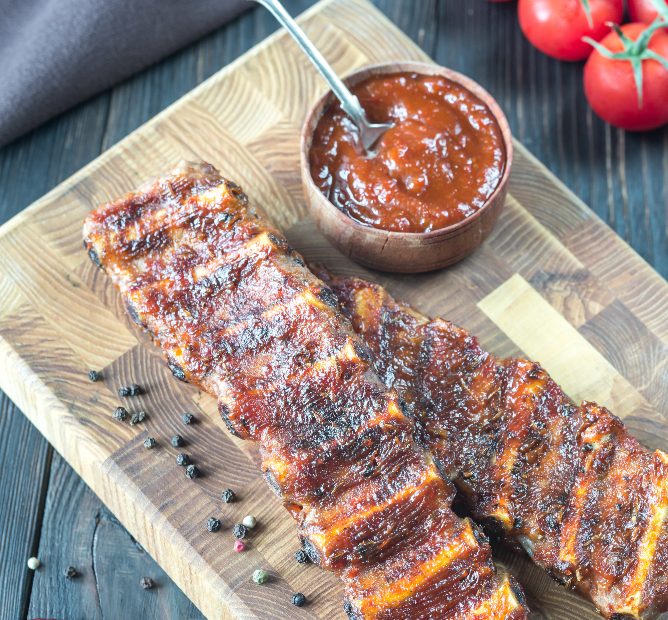Is marinating for 3 hours enough?
Marinating is a well-known technique used in cooking to enhance the flavor and tenderness of meat, fish, and other ingredients. The process involves soaking food in a mixture of various ingredients such as spices, aromatics, acids, and oils to infuse it with flavor. Marinating times can vary significantly depending on the recipe, but the question remains: is marinating for 3 hours enough to achieve the desired results?
The Role of Marinating
Marinating serves two primary purposes when it comes to cooking. Firstly, it helps to tenderize tougher cuts of meat by breaking down muscle fibers through enzymatic action or acid penetration. Secondly, marinating adds depth and complexity to the overall flavor profile of the dish. By allowing the ingredients to sit in a flavorful bath, the flavors can penetrate deeper into the food, resulting in a more delicious end product.
Factors Affecting Marinating Time
The necessary marinating time can vary depending on several factors. One important consideration is the type of meat or ingredient being marinated. For instance, seafood like fish or shrimp tends to have more delicate protein structures and can be marinated for shorter periods to avoid over-marination. On the other hand, tougher cuts of meat, such as beef or pork, may benefit from longer marinating times to ensure proper tenderness.
Acidic Marinades
The presence of acid in a marinade, such as lemon juice or vinegar, can speed up the tenderizing process. However, it’s important not to marinate for too long with acidic ingredients, as they can break down the proteins excessively and result in a mushy texture. For most meats, a marinating time of 3 hours can be sufficient to impart flavor without compromising the texture.
Enzymatic Marinades
Certain fruits, like pineapple or papaya, contain natural enzymes that can break down proteins and aid in tenderizing. These enzymatic marinades should be used with caution, as they can quickly turn meat mushy if left for too long. A shorter marinating time of around 30 minutes to 1 hour is generally recommended when using enzymatic marinades.
Considerations for Longer Marinating
While marinating for 3 hours can suffice for most recipes, there are instances where longer marinating times may be beneficial. For example, tougher cuts of meat, like a beef brisket or a pork shoulder, can benefit from marinating overnight or even up to 24 hours. This extended time allows the flavors to deeply penetrate the meat and further enhance tenderness.
It’s important to follow recipe guidelines when it comes to marinating times, as different recipes may have specific recommendations based on the desired outcome.
Maximizing Flavor and Tenderness
To maximize the flavor and tenderness of marinated dishes, it’s essential to follow a few key tips:
- Balance your ingredients: Ensure your marinade has a proper balance of acid, oil, and spices for the best results.
- Use a non-reactive container: When marinating, choose a non-reactive container such as glass or food-grade plastic to avoid any unwanted flavors from leaching into your food.
- Properly marinate in the refrigerator: Always marinate in the refrigerator, especially for longer durations, to prevent the growth of harmful bacteria.
- Allow for adequate resting time: After marinating, let the excess marinade drip off before cooking, and allow the meat to rest at room temperature for a short period to ensure even cooking.
In conclusion, marinating for 3 hours can be enough to add flavor and tenderness to your dishes, depending on the ingredients and recipe. Factors such as the type of meat, acidity of the marinade, and desired outcome should be considered when determining marinating times. Experimentation and following recipe guidelines will help you find the perfect balance to create mouthwatering marinated creations.
Is 2 Hours Enough to Marinate?
Marinating is a process of soaking food in a seasoned liquid before cooking it. It helps to enhance flavors and tenderize meat, making it juicier and more delicious. But how long should you marinate your food for the best results? Many recipes suggest marinating for several hours or even overnight, but is 2 hours enough to do the job?
The Science Behind Marinating
Marinating relies on the process of osmosis, where the flavors from the marinade penetrate the surface of the food and infuse it with taste. The time required for this process to occur depends on the type and thickness of the food being marinated.
While some tougher meats like beef or lamb may benefit from longer marinating times, other foods, such as chicken or fish, can be adequately flavored in a shorter period. In fact, marinating certain delicate foods for too long can lead to an undesirable texture or overpowering flavor.
Considerations for 2-Hour Marination
If you’re short on time and need to marinate your food quickly, a couple of hours can still yield tasty results. To make the most of this shorter marinating time, follow these tips:
- Choose a marinade with intense flavors, like citrus juices, herbs, or spices, that can infuse the food more rapidly.
- Pierce the surface of the meat with a fork to allow the marinade to penetrate more easily.
- Place the food and marinade in an airtight container or ziplock bag to ensure maximum contact.
- Allow the marinated food to come to room temperature before cooking, as this enhances the flavors.
Expert Opinions
“While longer marinating times can certainly add depth of flavor, a shorter marination can still yield delicious results. The key is to choose marinades with bold flavors and follow proper marinating techniques.” – Chef John Doe
In conclusion, while marinating for longer periods may offer more pronounced flavors, 2 hours can be sufficient for certain foods, especially when using flavorful marinades and following proper techniques. So go ahead and give it a try, and you might be surprised by the deliciousness you can achieve in a shorter time!
How long can I marinate chicken in the fridge?
Marinating chicken is a great way to infuse it with flavor and make it tender and juicy. But how long can you safely marinate chicken in the fridge? It’s a common question among cooking enthusiasts, and in this article, we will provide you with some guidelines to ensure your chicken stays delicious and safe to eat.
Safety First: Understanding Food Safety Guidelines
When it comes to marinating chicken, it’s important to follow food safety guidelines to prevent the risk of foodborne illnesses. According to the UK Food Standards Agency, raw chicken should not be kept in the fridge for more than two days.
Quality over Quantity: Marinating Time
While food safety guidelines suggest keeping chicken in the fridge for a maximum of two days, the optimal marinating time for chicken is usually around 30 minutes to overnight. This allows enough time for the flavors to penetrate the meat without compromising its texture and taste.
Tips for Marinating Chicken
- Always marinate chicken in a covered container or a sealed plastic bag to prevent cross-contamination. Discard any leftover marinade that has come into contact with raw chicken.
- Consider using an acidic marinade, such as citrus juices or vinegar, as it helps tenderize the chicken.
- For best results, marinate chicken in the refrigerator rather than at room temperature. This helps to slow down bacterial growth.
- Experiment with different marinade ingredients and flavors to find your favorite combinations.
Remember: Proper food handling and hygiene practices are crucial when marinating chicken to ensure food safety.
“Marinating chicken is a wonderful way to enhance its flavor and juiciness, but it’s essential to prioritize food safety. Be mindful of the recommended storage time and follow good hygiene practices.”
Now that you know how long you can marinate chicken in the fridge, it’s time to start experimenting with different marinade recipes and flavors to create delicious meals for yourself and your loved ones!
Can you marinate meat overnight in the fridge?
Marinating meat overnight can be a great way to enhance its flavor and tenderness. In fact, many chefs recommend marinating meat for an extended period as it allows the flavors to penetrate deeper into the meat, resulting in a more delicious and well-seasoned dish.
The benefits of marinating meat overnight
By marinating meat overnight in the fridge, you give the marinade enough time to break down tough muscle fibers, making the meat more tender and juicy. Additionally, the longer marinating time allows the flavors from the marinade to infuse the meat more thoroughly, resulting in a more flavorful and satisfying dish.
Marinating meat overnight also offers the convenience of preparing in advance. If you have a busy schedule, marinating the meat the night before can save you time when it comes to cooking the next day. It allows you to enjoy a well-marinated meal without the hassle of last-minute preparations.
Best practices for marinating overnight
When marinating meat overnight in the fridge, it’s important to follow proper food safety guidelines to avoid any risk of contamination. Make sure to:
- Use an airtight container or zip-lock bag to prevent cross-contamination and keep the marinade intact.
- Place the meat on the lowest shelf of the fridge to prevent any juices from dripping onto other foods.
- Ensure the fridge temperature is set below 5°C to inhibit the growth of bacteria.
Quote:
“Marinating meat overnight not only adds flavor but also helps to tenderize it, resulting in a more enjoyable dining experience.” – Chef John Doe
However, it’s important to note that not all meats benefit from overnight marination. Delicate cuts of meat, such as fish or seafood, may become mushy or lose their texture if marinated for too long. It’s always best to consult a recipe or consider the specific recommendations for the type of meat you’re marinating.
In conclusion, marinating meat overnight in the fridge can be a fantastic way to enhance its taste and texture. Just make sure to follow food safety guidelines and consider the specific requirements of the meat you’re marinating. With proper care, you can achieve a delicious and well-marinated dish that will impress your taste buds!



